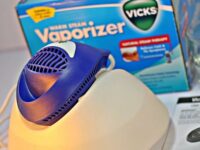Allergies can be a frustrating and uncomfortable experience for many people. There are a variety of remedies available to help alleviate allergy symptoms, including Vicks Vaporub. But does Vicks really help with allergies? In this article, we’ll take a closer look at Does Vicks Help With Allergies and the use of Vicks for allergies and explore some of the most common questions people have about this remedy.
In which allergies does Vicks help?
Vicks Vaporub can be helpful in providing relief from some common allergy symptoms, such as a stuffy or runny nose, coughing, and congestion. However, it’s important to note that Vicks is not a cure for allergies and should not be used as a substitute for proper medical treatment.
Where do you apply Vicks for allergies?
To use Vicks for allergies, apply a small amount of the ointment to the chest, throat, or back. This can help to alleviate congestion and coughing. Some people also find it helpful to apply Vicks to the nostrils to help with stuffiness and itching.
Can Vicks be used for seasonal allergies?
Vicks Vaporub is not a treatment for seasonal allergies, but it can help alleviate some of the symptoms. When applied topically to the chest or back, the menthol in Vicks can help open up the nasal passages and ease congestion, making it easier to breathe. However, it is important to note that Vicks will not cure the allergy, but only provide temporary relief from the symptoms.
Is Vicks safe to use for allergies?
Vicks Vaporub is generally safe to use for allergies when used according to the instructions on the packaging. However, some people may be allergic to one or more of the ingredients in Vicks, such as camphor or eucalyptus oil. If you experience any adverse reactions, such as skin irritation or difficulty breathing, discontinue use immediately and seek medical attention.
Can Vicks cause allergies?
In rare cases, Vicks may cause an allergic reaction. Symptoms of an allergic reaction to Vicks may include skin rash, itching, hives, swelling of the face, tongue, or throat, and difficulty breathing. If you experience any of these symptoms, stop using Vicks immediately and seek medical attention.

Can Vicks help with allergic rhinitis?
Allergic rhinitis, also known as hay fever, is an allergic reaction to airborne allergens such as pollen, dust mites, or pet dander. While Vicks Vaporub cannot cure allergic rhinitis, it can help relieve some of the symptoms associated with the condition, such as nasal congestion and runny nose.
Can Vicks cure allergies?
Vicks Vaporub cannot cure allergies, but it can provide temporary relief from the symptoms associated with allergies. It is important to remember that the only way to cure allergies is to identify the allergen and avoid exposure to it.
Can Vicks be used with other allergy medications?
While Vicks can be used with other allergy medications, it is important to speak with a doctor before combining different medications. Some medications may interact with Vicks, and combining certain medications may increase the risk of side effects.
Does the Vicks stick help with allergies?
Vicks also comes in a stick form, which can be convenient for on-the-go use. The stick can be applied to the chest, throat, and back in the same way as the ointment to help with congestion and coughing.

Will Vicks help allergy cough?
Vicks can help to alleviate a cough caused by allergies, particularly when applied to the chest or throat. The menthol in Vicks can help to soothe irritated airways and reduce coughing.
Can I use Vicks for an itchy nose?
Yes, Vicks can be used to help alleviate an itchy nose caused by allergies. Apply a small amount of Vicks to the nostrils to help reduce itching and irritation.
How to stop nose itching?
In addition to using Vicks, there are a variety of other remedies that can help to alleviate an itchy nose caused by allergies. Some options include using a saline nasal spray, taking antihistamines, and avoiding allergens.
What is good for a stuffy itchy nose?
Along with Vicks, there are a variety of other remedies that can help to alleviate a stuffy and itchy nose caused by allergies. These include using a humidifier, taking decongestants, and using nasal irrigation.
What if I put Vicks in my nose?
While applying a small amount of Vicks to the nostrils can help to alleviate itching and congestion, it’s important not to use too much or to apply it too frequently. Using too much Vicks or using it too often can irritate the nasal passages and potentially cause harm.

What else is Vicks good for?
In addition to helping with allergy symptoms, Vicks can be helpful in providing relief from coughs, congestion, and sore muscles. It can also be used as a vaporizer to help clear congestion and promote relaxation.
Can I put Vaseline in my nose?
While Vaseline may help to alleviate dryness and itching in the nose, it’s not recommended for use in the nostrils. Vaseline can potentially cause harm if inhaled into the lungs, so it’s best to avoid using it in this way.
Does rubbing Vicks on your feet help stuffy nose?
While there’s no scientific evidence to support the use of Vicks on the feet to alleviate a stuffy nose, some people find it helpful. Rubbing Vicks onto the feet and then covering them with socks can help to promote relaxation and potentially alleviate congestion.
How do you stop a stuffy nose at night?
To alleviate a stuffy nose at night, try sleeping with your head elevated, using a humidifier, and using saline nasal sprays or nasal irrigation. You can also try using Vicks or other decongestant products to help with congestion and promote relaxation.
Is it safe to inhale Vicks in hot water?
While some people may find it helpful to inhale Vicks in hot water, it’s important to use caution. Inhaling steam can be dangerous, particularly for children or individuals with certain medical conditions. It’s best to consult with a healthcare provider before attempting this remedy.

Why put Vicks on feet at night?
While there’s no scientific evidence to support the use of Vicks on the feet, some people find it helpful in promoting relaxation and alleviating congestion. The feet have many nerve endings, so applying Vicks to this area may help to stimulate circulation and promote relaxation.
Conclusion:
Vicks Vaporub can be a helpful remedy for alleviating allergy symptoms such as congestion, coughing, and itching. However, it’s important to use caution and not rely solely on Vicks as a substitute for proper medical treatment. If you’re experiencing severe allergy symptoms, it’s important to consult with a healthcare provider for proper diagnosis and treatment.






